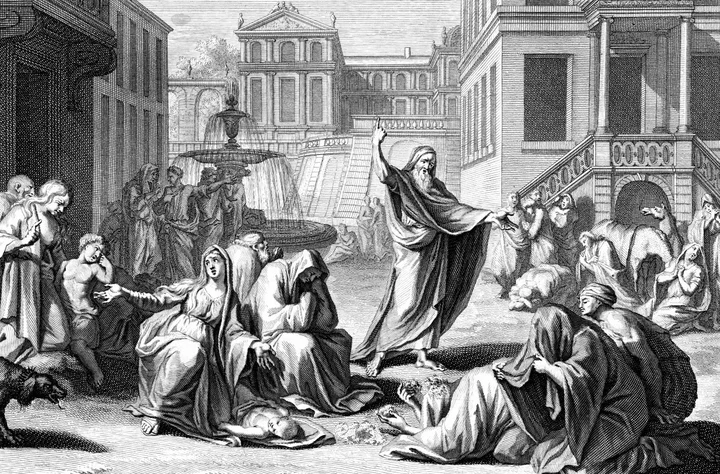Jonah and the Ninevites.
###
###
After spending three days and nights inside a watery, claustrophobic tomb, praying and crying out to the God he still believed in, Jonah was vomited out of that big fish and onto a beach. I can imagine him kissing the earth in gratitude to be alive, raising his arms up high and stretching out his sore back. Stumbling from hunger and seasickness, he looked around, hoping to find a nearby village where he could rest and reorient himself. I imagine him settling into a local inn, hearing that word from God about Nineveh once again: “Go to the great city of Nineveh and proclaim to it the message I give you.”
I wonder if he felt new excitement about his second chance at life, regardless of this old word. And as he began traveling, I bet he was full of praise and hope for those first few days. But as those days of traveling turned into a week, his excitement and fervor probably shifted, as silence and solitude can do. Silence has a way of revealing what’s actually in our hearts, but what we do with that data is up to us. He had the message, but with every silent step he took, he remembered who this message was to go to — the most horrifically violent, undeserving of mercy, people the world had ever known. I imagine him muttering and arguing with God, turning around a dozen times throughout that month of travel, his sandaled feet kicking rocks in protest.
But Jonah had a message and since he was a prophet he would bring the message to the people, because that was his job.
There’s quite a lot of ancient prophetic writings throughout the Hebrew Bible. Their messages from the Lord are long and filled with flowery language. Their prophecies contain specific details, weaving poetry, allegory, and stories together for the people. Some prophets even participated in guerrilla-type theater for dramatic affect, helping people understand the point. But it seems like Jonah spent his entire travels cutting this message down to the bare minimum, strategically sabotaging God’s words. He wondered, “How can I say what needs to be said as quickly and succinctly as possible.”
By the time Jonah arrived, he had perfected this message to five Hebrew words. He walked around the city for a few days and, like a broken record without any dramatic flair or stage presence, he announced, “In forty days Nineveh will be overthrown.”
Jonah didn’t mention God.
He didn’t mention why they would be overthrown.
He didn’t give details about what they should do to NOT get overthrown.
Or who would overthrow them.
But the king of Assyria took this brief message incredibly seriously. He stepped off his throne, away from his authority and hierarchy and power to sit in the dirt. Sitting in the dirt gives a person a whole new perspective. You can see the world differently in the dirt. You can see what matters most in the dirt. This king, covered in dirt and ash, then commanded his people and animals to do the same — to cover themselves with goat hair and stop eating or drinking anything because they were entering a time of mourning and repentance. Repentance means to stop going the direction you are heading and go a different way. It means to turn around. It reveals new perspective. For Nineveh, this story shows they ceased and stopped everything so they could discover this new direction and perspective.
This brief and vague message Jonah gave to the Ninevites was enough for them to stop everything and pay attention. And God’s response towards them was great compassion.
Jonah 3:10 : “When God saw what they did and how they turned from their evil ways, God relented and did not bring on them the destruction God had threatened.”
The word for “relented” is “nacham” which means compassion, pity, and sorrow. God saw how these leaders and people intentionally took off their robes and crowns, put on goat hair fleeces, and sat in the dust in deep mourning. God saw them with love and compassion because they were more than the harm they had caused.
God saw them.
God saw Jonah in his irritated and frustrated state. God saw the Ninevites in their desire to change. And God sees you in your uncertainty and apprehension on the decisions you must make today.
Know that you are seen with all the love and compassion. So come into the silence and be still for a moment. Step down from whatever throne you might be on and travel down to the dirt. It’s here in the dirt you might see that new perspective you need. It’s in the dirt — the same particles and atoms you’re made from — you might know you are seen and loved by Love. Mercy is near.
###
Bethany Cseh is a pastor at Arcata United Methodist Church and Catalyst Church. Follow her on Instagram.

CLICK TO MANAGE